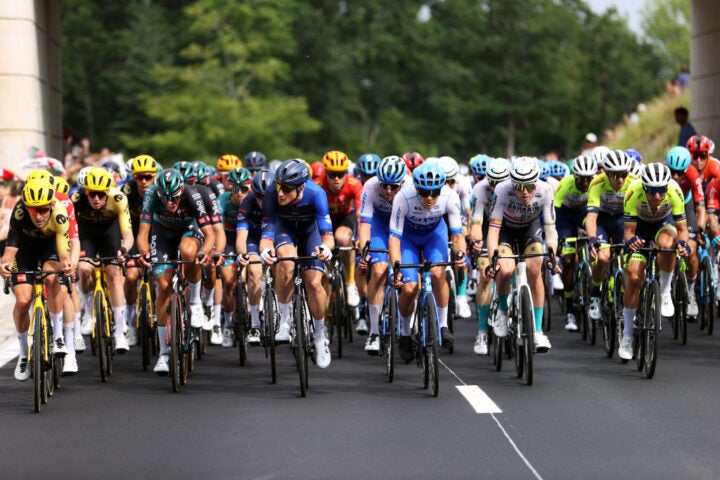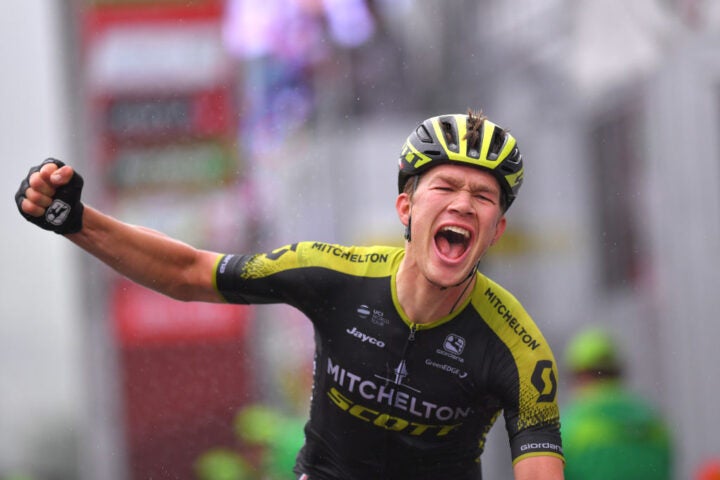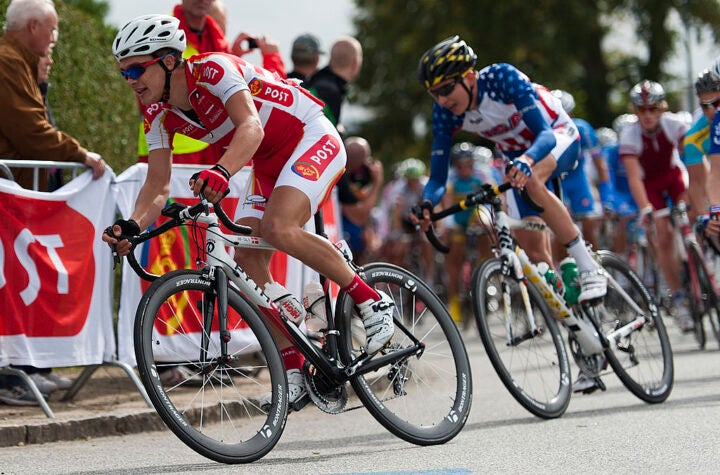Heading out the door? Read this article on the new Outside+ app available now on iOS devices for members! Download the app.
Cycling is a sport that lends itself to poetry. Its stunning scenes, tales of brutal physical struggle, and mental battles fall easily into the art form.
Jayco-AlUla’s Chris Juul-Jensen, who is riding his sixth Tour de France, has often turned to poetry as a way of wrangling his thoughts and emotions about his days on the bikes. Juul-Jensen has carved a career for himself as a reliable domestique, a fact that is borne out by the fact that he has been racing consistently at WorldTour level since 2012.
The 33-year-old still harbors the desire to win, but his job is to push himself to his limits for others to give them the best chance to win. Though he considers English to be his first language, after spending his formative years in Ireland, he likes to write his poetry in Danish, though he hasn’t done much lately.
“I sort of feel like I can express myself in a different way and get away with it,” he told Velo of his decision to write in Danish. “Whereas it doesn’t feel natural for me to do it in English, even though English is my mother tongue. I haven’t done much lately. But maybe that’s because, in the last couple of years, I have just become very much relaxed in terms of what I do, why I am doing it, and what the point is. It all makes sense.
Also read:
- From bike shop worker to Tour de France racer: the incredible journey of Elmar Reinders
- Tour de France unsung heroes: Jonas Abrahamsen on gaining almost 20 kilos to go faster
- Unsung heroes: Imogen Cotter on coming back from a near-death experience
“Often, I use writing to reflect or try to make sense of what life is as a bike rider. The suffering and everything that’s involved with cycling often don’t really make sense. It was hard to understand. I was able to use writing to paint that picture, take the words out of my head, and try to describe how it feels, what feels like to get dropped or what feels like suffering up the mountains. There are so many aspects of cycling that make it so great, and why so many people are fascinated by cycling. It’s like a movie or a piece of theater, it’s a story, it’s a drama, it’s a sport. It’s about getting from A to B, but there’s so much in between.”
You won’t find Juul-Jensen’s poetry in a blog or on his Instagram account, he has largely kept it to himself and he has no plans to make it public any time soon.
“I enjoy being able to express myself in that way, but maybe don’t have to let the whole world know. But you never know. Maybe the day I retire it could be a good way to sort of introduce people to my world of bike riding. At the moment, no. I just have it lying on my phone, for me to read,” he said. “There’s this whole lot of having to try and tell everyone, everything about what you’re doing on social media and shit like that. You don’t have to sell the dream all the time.”

The poetry hasn’t been kept under total lock and key and Juul-Jensen did show it publicly for the first and only time when he took part in a short documentary called The Butler by a filmmaker called Daniel Dencik. The 25-minute feature, which is in Danish, follows Juul-Jensen during the 2018 season and delves into who he is as a bike rider — anyone interested in watching it can do so here for €4.99.
It delved into what it takes to be an ambitious bike rider that works for others, and Juul-Jensen’s desire to also win for himself. The timing was perfect as he went on to win a stage of the Tour de Suisse that season.
“It was about me being a domestique and the life that is working for others. At the same time, it’s my identity as a bike rider, that’s what I’m good at, and that’s what I knew I’d have to try and master if I was to have a long career because I’ve never been one of the biggest talents winning many races,” Juul-Jensen said. “I knew if I was to stay in the scene for long and I’d have to just be good at doing work, and that was what this film was about.
“Some people may look at it as it doesn’t sound very ambitious, ‘why don’t you go try and ride for yourself or try to win your own races?’ I say in the movie, it’s what I dream of every day, that’s what it’s all about. It’s all about winning, but you also have to understand your limits. You don’t win most of the time. But that doesn’t mean that you don’t have the desire to win, which feeds the hunger for training, racing, and performing. There’s always sort of a want or need to be better than the next guy.
“You may finish 30 minutes behind, but if you did a lot of work before you get dropped and get credit for it then it all makes sense. If you just sort of doss around in the bunch, not really doing anything, it all becomes meaningless. Luckily, it ended with me winning. One of my few wins was the year they made the film at the Tour de Suisse. So that’s pretty cool.”

A dual identity
Those who are not familiar with Juul-Jensen may be surprised when they hear him speaking English. Rather than the accent we’re used to hearing from the likes of Mads Pedersen or Michael Mørkøv, there’s a distinct Irish accent coming through.
Though both of his parents are Danish, Juul-Jensen spent his youth growing up in Wicklow, a county on the east coast of Ireland just south of Dublin. He lived there until his mid-teens and has managed to keep a hold of his accent until now.
“It’s a reminder of where I’m from… If I were to lose my accent, then I’d lose my identity, to be honest. It sort of keeps me grounded with regard to where I’ve grown up. Despite not having lived there for over 17 years now. It’s nice,” he said. “I speak English most of the time when I’m on the road and so I have a chance to keep up to date with it. If I only spoke Danish or another foreign language it may disappear. I’d be heartbroken. It hurts me a little bit when people say ‘I can hear you’re not Danish, you’re from somewhere else. I say I grew up in Ireland and they say ‘there’s a bit of an accent.’ A bit?”
Juul-Jensen was born in Ireland after his parents moved there for work. It was only meant to be for a short time, but they fell in love with the country and decided to make a life there. Juul-Jensen was the second of their three children, he has an older brother and a younger sister.
He became interested in cycling at an early age, through his dad, but he was keen on nearly all sports — except for some of the more physical ones like rugby or Gaelic sports such as hurling or football.
“I played school [field] hockey and played for a club, Monkstown Hockey Club. But then, eventually, towards the end of my transition year, or my junior year, cycling became more and more serious whereas hockey became just another sport that I did,” Juul-Jensen said. “Looking back, it was only a good thing to be exposed to all sorts of sports, you know, so it doesn’t become cycling is everything too early. Once I left to go to Denmark, I didn’t regret not being able to play hockey, I was fully committed to just being able to cycle all the time.
“I miss my friends from St. Andrews and the friends I had through hockey. I have lost touch with them, unfortunately, but I have fond memories of my school years in Ireland, growing up playing hockey, and whatnot.”

Juul-Jensen left for Denmark when he was 16 as his cycling was really beginning to take off. His older brother had already moved there and was loving it and the system to support young budding professionals was far better in Denmark than it was in Ireland.
With two of their children now moving to Denmark, Juul-Jensen’s parents decided to follow suit and the whole family relocated. Though his Danish was not at the level of a native, he settled into life as a Dane pretty quickly.
He’s had few chances to go back to Ireland since he left, but he still has a connection with the country where he spent the first 16 years of his life.
“The transition from living in Ireland, and considering myself Irish just sort of happened, you know, I didn’t really think about it. I was only 16 when we left, so I didn’t pay much attention to my feelings about what I was. I was just sort of concentrating on wanting to ride my bike,” Juul Jensen said. “The year before we left, I was, it was, it was just a question of making the Youth Olympics team, it was the most important thing in the world.
“We came to Denmark, and at that age, you integrate really quickly, surrounded by Danish mates, cycling friends, and soon it became my passion to become part of the elite Danish cycling scene because there’s just such a high level internationally as well. That was for me the goal and that then led me to become part of the Danish national team. I went from being Irish to Danish through cycling.
“I do consider myself Danish, but at the same time, I’m extremely proud of my Irish background. I’m reminded of that, especially when I travel with the team. It’s an Australian English-speaking team and we have a few Irish soigneurs, mechanics, and now [Eddie] Dunbar. Chatting with him, it brings me back and then it feels like I never left.
“But then when I go home to Denmark, I have a Danish wife, kids, and a life. lived in Denmark more than in Ireland. I’ve got a foot in both places, depending on where I am really. I’m super happy to have that feeling.”